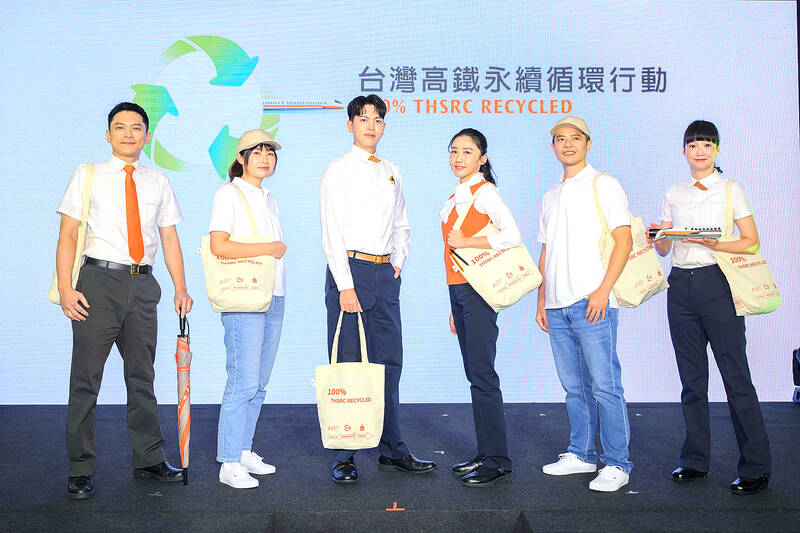The Taiwan High Speed Rail Corp (THSRC) yesterday said it is stepping up efforts to curb carbon emissions by recycling plastic bottles collected at high-speed rail stations and turning them into different products, including employees’ uniforms.
Recyclable plastic bottles and microwavable food containers account for a majority of the waste found at high-speed rail stations, statistics from the high-speed rail operator showed.

Photo: CNA
As THSRC began implementing its “100% THSRC Recycled” initiative last year, it set a goal of gradually replacing employees’ uniforms with ones made from eco-friendly fabrics, the company said.
Plastic bottles can be reprocessed to produce recycled polyester (PET), which can be used to make uniforms for THSRC employees, it said, adding that it would begin replacing shirts worn by station and onboard personnel with ones made by PET first.
The company distributes about 18,600 sets of new uniforms per year, including those for new employees and those requested by existing employees.
In a news conference, the company presented uniforms, baseball caps, pens and foldable umbrellas made from plastic bottles collected from high-speed rail stations nationwide.
It also showed shopping bags made from recycled microwavable food containers.
THSRC president James Jeng (鄭光遠) said the company has since March last year partnered with Taiwanese start-up Raingo offer umbrella-sharing services using these eco-friendly umbrellas.
He added that the service would be available in its 12 stations across the nation as well as Taoyuan and Taipei MRT stations and 500 rental shops owned by Raingo.
The company has implemented other plastic-reducing measures, such as replacing plastic covers of the seat’s headrest with ones made by wood pulp fiber and using reinforced paper lids on hot beverage cups.
New train window shutters are designed to block 92 to 95 percent of sunlight, allowing the onboard air-conditioning system to operate more efficiently.
Last year, the company said that it successfully decreased waste by 17 tonnes, which reduced carbon emissions by nearly 48 tonnes.
Meanwhile, the company would soon build its second vehicle maintenance facility at its Zuoying (左營) depot in Kaohsiung using water-conservation design and low-carbon construction materials.
With an open roof and three-dimensional vents, the air inside the facility would circulate freely, reducing reliance on air-conditioning, the company said.
About 3,660 solar panels are to be installed on the rooftop of the facility, which would collectively generate a peak power output of 1,318 kilowatts.
The facility, which is scheduled to begin operations in December 2027, would increase the rail operator’s maintenance capacity from 38 trains to 47, with the maximum number of trains parking in the depot rising from 44 to 50, the company said.
Separately, the company unveiled its track geometry inspection vehicle, which it said has greatly facilitated its track maintenance work and improved safety.
The vehicle, which the company procured from Vienna-based track maintenance machine manufacturer Plasser & Theurer, has been in use since 2023, allowing the company to detect visible anomalies on the rail surface, such as missing rail fasteners and damaged parts. The company records this data and uses it to plan maintenance operations, it said.

An essay competition jointly organized by a local writing society and a publisher affiliated with the Chinese Communist Party (CCP) might have contravened the Act Governing Relations Between the People of the Taiwan Area and the Mainland Area (臺灣地區與大陸地區人民關係條例), the Mainland Affairs Council (MAC) said on Thursday. “In this case, the partner organization is clearly an agency under the CCP’s Fujian Provincial Committee,” MAC Deputy Minister and spokesperson Liang Wen-chieh (梁文傑) said at a news briefing in Taipei. “It also involves bringing Taiwanese students to China with all-expenses-paid arrangements to attend award ceremonies and camps,” Liang said. Those two “characteristics” are typically sufficient

A magnitude 5.9 earthquake that struck about 33km off the coast of Hualien City was the "main shock" in a series of quakes in the area, with aftershocks expected over the next three days, the Central Weather Administration (CWA) said yesterday. Prior to the magnitude 5.9 quake shaking most of Taiwan at 6:53pm yesterday, six other earthquakes stronger than a magnitude of 4, starting with a magnitude 5.5 quake at 6:09pm, occurred in the area. CWA Seismological Center Director Wu Chien-fu (吳健富) confirmed that the quakes were all part of the same series and that the magnitude 5.5 temblor was

The brilliant blue waters, thick foliage and bucolic atmosphere on this seemingly idyllic archipelago deep in the Pacific Ocean belie the key role it now plays in a titanic geopolitical struggle. Palau is again on the front line as China, and the US and its allies prepare their forces in an intensifying contest for control over the Asia-Pacific region. The democratic nation of just 17,000 people hosts US-controlled airstrips and soon-to-be-completed radar installations that the US military describes as “critical” to monitoring vast swathes of water and airspace. It is also a key piece of the second island chain, a string of

The Central Weather Administration has issued a heat alert for southeastern Taiwan, warning of temperatures as high as 36°C today, while alerting some coastal areas of strong winds later in the day. Kaohsiung’s Neimen District (內門) and Pingtung County’s Neipu Township (內埔) are under an orange heat alert, which warns of temperatures as high as 36°C for three consecutive days, the CWA said, citing southwest winds. The heat would also extend to Tainan’s Nansi (楠西) and Yujing (玉井) districts, as well as Pingtung’s Gaoshu (高樹), Yanpu (鹽埔) and Majia (瑪家) townships, it said, forecasting highs of up to 36°C in those areas